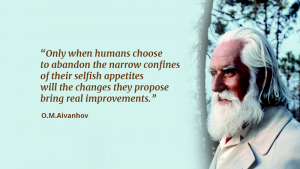Is there a connection between our inner life and the effectiveness of germs? An extract from one of Rudolf Steiner’s lectures – held in Basel over a century ago, in 1914.
“As we know, people today are haunted by a fear we can compare with the medieval fear of ghosts. It is the fear of germs. Objectively, both states of fear are the same. Both fit their respective age: People of the Middle Ages held a certain belief in the spiritual world; therefore quite naturally they had a fear of spiritual beings. The modern age has lost this belief in the spiritual world; it believes in material things. It therefore has a fear of material beings, be they ever so small.
Objectively speaking, the greatest difference we might find between the two periods is that ghosts are at any rate sizable and respectable. The tiny germs, on the other hand, are nothing much to write home about as far as frightening people is concerned. Now of course I do not mean to imply by this that we should encourage germs, and that it is good to have as many as possible. That is certainly not the implication. Still, germs certainly exist and ghosts existed also, especially as far as those people who held a real belief in the spiritual world are concerned. Thus, they do not even differ in terms of reality.
However, the important point we want to make today is that germs can become dangerous only if they are allowed to flourish. Germs should not be allowed to flourish. Even materialists will agree with this statement, but they will no longer agree with us if we proceed further and, from the standpoint of proper spiritual science, speak about the most favorable conditions for germs.
Germs flourish most intensively when we take nothing but materialistic thoughts into sleep with us. There is no better way to encourage them to flourish than to enter sleep with only materialistic ideas, and then to work from the spiritual world with the ego and the astral body on those organs that are not part of the blood and the nervous system.
The only other method that is just as good is to live in the center of an epidemic or endemic illness and to think of nothing but the sickness all around, filled only with a fear of getting sick. That would be equally effective. If fear of the illness is the only thing created in such a place and one goes to sleep at night with that thought, it produces afterimages, Imaginations impregnated with fear. That is a good method of cultivating and nurturing germs.
If this fear can be reduced even a little by, for example, active love and, while tending the sick, forgetting for a time that one might also be infected, the conditions are less favorable for the germs.
These issues are not raised in anthroposophy merely to play on human egotism, but to describe the facts of the spiritual world. This concrete case demonstrates that in real life we cannot avoid dealing with the spiritual world, because it is the basis for our actions between going to sleep and waking up. If people were given thoughts that lead them away from materialism and spur them on to active love out of the spirit, it would serve the future of humanity better. Then infinitely more productive work could be achieved than through all the preparations now being developed by materialistic science against germs.
In the course of this century, the insight has to spread more and more widely that the spiritual world is by no means irrelevant to our physical life, but is of essential importance to it because we are in the spiritual world between going to sleep and waking up, and continue to affect the physical body from there. Even if this is not immediately obvious, it is nevertheless true.”
Source: Rudolf Steiner – GA 154 – Presence of the Dead: Lecture Three: Awakening Spiritual Thoughts – Basel, May 5, 1914
Translated by Harry Collison










